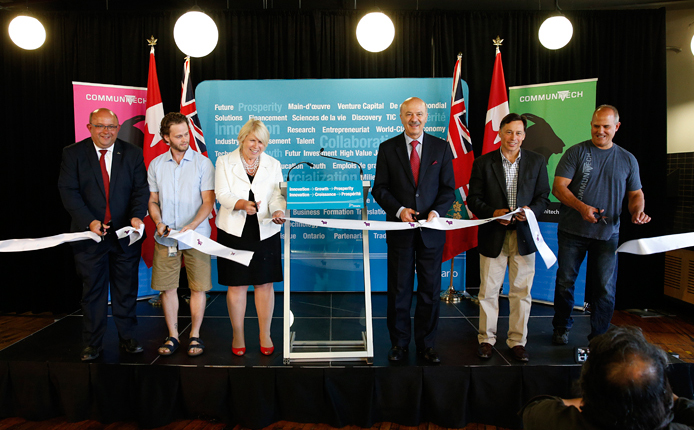A freshly expanded Communitech Hub officially opened with a bang today, as the Ontario Government announced a $1.2 million investment to support Waterloo Region startups and high-growth companies through the enlarged facility.
Reza Moridi, Minister of Research, Innovation and Science, was joined by two cabinet colleagues – Brad Duguid, Minister of Economic Development and Growth; and Deb Matthews, Minister of Advanced Education and Skills Development and Minister Responsible for Digital Government – in celebrating the launch of the three-level, 80,000-square-foot space, up from the 55,000 square feet the Hub previously occupied on the ground floor of Kitchener’s former Lang Tannery.
“This new space is going to provide much more capacity and much more opportunity for startup companies to grow and to become multimillion-dollar companies, billion-dollar companies,” Moridi told an enthusiastic crowd gathered on the Hub's brightly lit new second floor.
The expanded Hub is a partnership between Communitech, Google Canada, the University of Waterloo, the City of Kitchener and the province. Google made the extra space available when its Canadian engineering headquarters moved to a much larger facility in the nearby Breithaupt Block earlier this year.
Moridi lauded the partnership, saying, "This spirit of collaboration speaks to the fact that if you’re going to succeed in the very competitive, fierce economy worldwide, we need to work together to collaborate between industry, government, academia and the various institutions. That is the Canadian way and the Ontario way of doing business in the 21st century."

(Left to right) Kitchener Mayor Berry Vrbanovic;
Google Canada's Kory Jeffrey; Ontario Ministers Deb Matthews,
Reza Moridi and Brad Duguid join Communitech CEO Iain Klugman
in launching the expanded Communitech Hub.
(Photo: Wayne Simpson for Communitech)
Matthews, who is also Deputy Premier and Cabinet Chair, spoke to the energy she and many visitors feel upon entering the Hub.
"I’ve been here a few times, and every time I come I’m just overwhelmed and kind of blown away by the energy and the brilliance and the commitment of people who work here," Matthews said. "It is truly a very, very special place; in fact, I think there is no place like this in the world, and it’s the way it is because of the people who are here."
The boost in capacity will enable Communitech to do more to help technology companies, through expanded services for startups, more work space for startups and mid-sized companies, innovation zones where companies of all sizes can collaborate, training programs for mid-sized companies, and more corporate innovation programming to help global brands become more nimble and boost the speed of getting new products to market.
“Overall, it provides the foundation to meet our goal of helping to build 10 new $100-million companies in Waterloo Region over the next 10 years,” said Iain Klugman, Communitech’s CEO.
The expansion will also serve efforts to build the Toronto-Waterloo region into a globally-ranked innovation corridor that can help further drive the provincial and national economies.
That potential is what drew Google to the region 11 years ago, when it set up a small outpost that has since ballooned into a major presence.
Kory Jeffrey, a former Communitech team member who now heads developer relations for Google Canada, suggested that's no accident.
"When Google first contemplated extending outside of California, we sent people all over the world, and the people who came back from Waterloo said that we absolutely had to be here," Jeffrey said. "They couldn’t quite explain why; they just said that something was going on in Waterloo, and that we had to become part of it. And so we did. We built one of the largest engineering teams outside of the U.S. for Google, here in K-W."
Google has not only grown its own operations substantially during that time, but has become a key partner in building the Waterloo Region tech ecosystem through various initiatives, such as the Google for Entrepreneurs program for startups, and student outreach programs to build fundamental tech skills.
"We continue to collaborate with organizations like Communitech and the University of Waterloo, which we believe are world-class in their ability to build capacity and help this region compete on a global stage," Jeffrey said.
Duguid, a frequent visitor to the Hub during his time in government, said he was "delighted" to return with two cabinet colleagues, which he said speaks volumes about the importance of the Waterloo Region tech community to the province.
"I’m standing right now in what I think is the epicentre of the future establishment of Ontario as a global leader in the next-generation economy, and I’m not exaggerating when I say that," Duguid said. "This is where it’s happening, folks."
Earlier this year, Kitchener city council pledged $300,000 towards the expansion, following on from its initial $500,000 investment in 2010 that helped launch the Hub and catalyze the reinvigoration of the city’s downtown.
At today’s event, Mayor Berry Vrbanovic said Communitech has “helped develop Kitchener’s reputation as a critical node in one of the most dynamic startup ecosystems in the world.” He said the city's downtown is enjoying "an economic vibrancy we haven't seen in decades" thanks to the dozens of companies that have engaged with the Hub and established a presence in the blocks around it.
Top photo: (Left to right) Ontario Cabinet Ministers Brad Duguid (pointing), Deb Matthews and Reza Moridi visit the Christie innovation lab during a tour of the expanded Communitech Hub.

